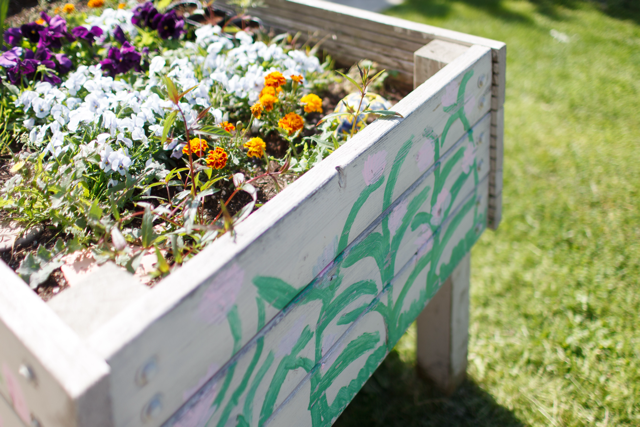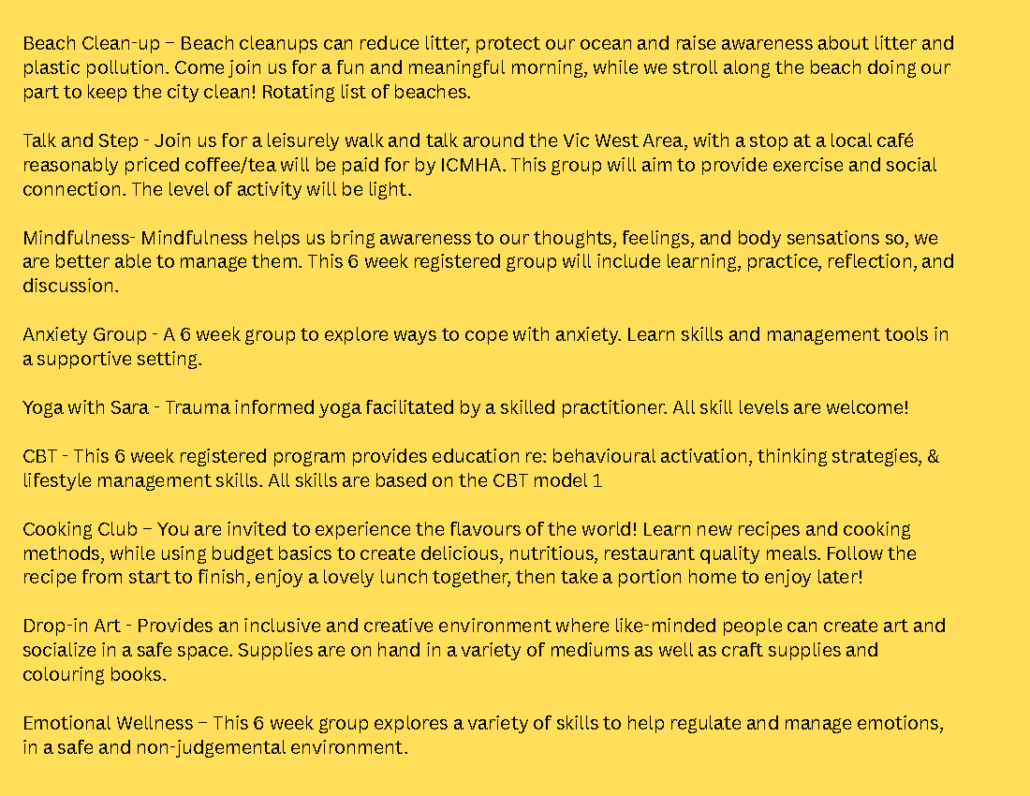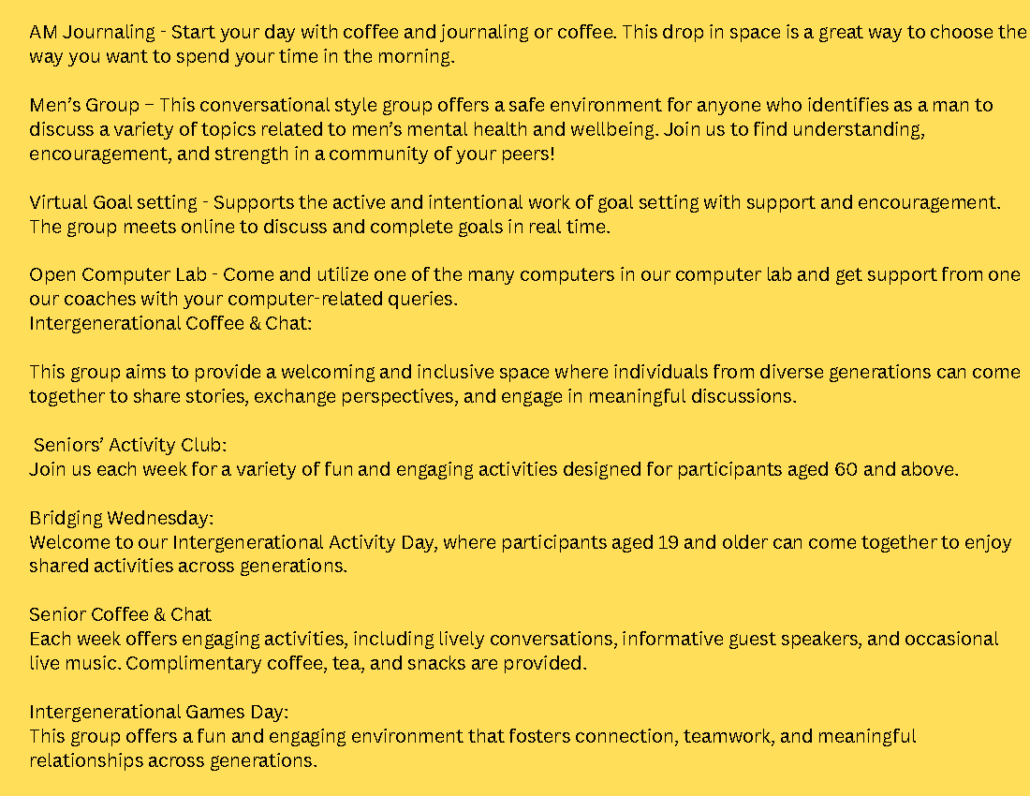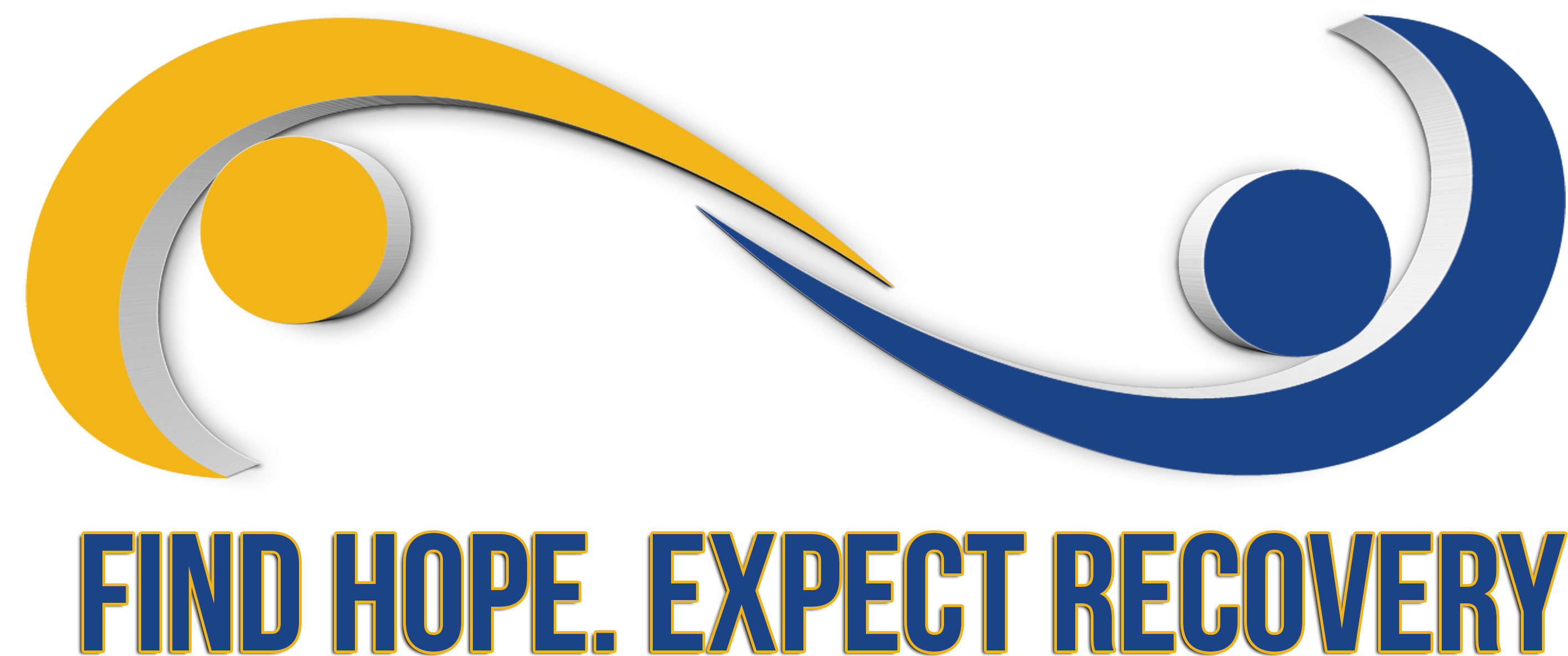GROW with ICMHA

What is Grow?
“At Grow they don’t know me by my diagnosis, but for who I am.” – Grow Client
The content of groups changes throughout the year and over time as all of our programming is person-focused. To see a description of the groups we offer please, click “Grow Groups” below.
Grow helps clients:
– Develop meaningful activities
– Build skills to better understand their mental health
– Build a support network
– Transition to community
(Connections Place, Employment, Education, Volunteering, Rec Centres…)
Philosophy
The Grow program provides Psychosocial Rehabilitation (or PSR) services designed to promote personal recovery, successful community integration, and maintenance of a satisfactory quality of life.
PSR focuses on helping individuals develop skills, access resources and improve their quality of life by building on their strengths. Individuals set their own goals and choose how to achieve them.
At GROW we believe:
– Everyone has the potential and right to lead a purposeful life.
– A supportive environment is central to achieving goals and maintaining structure.
– Engaging in meaningful activities and being with others helps promote recovery.
– Individuals are not defined by their mental illness.
– Everyone has strengths and skills.
Grow addresses all dimensions of wellness – the physical, mental, emotional and spiritual.
Our service integrates staff and participant’s ideas in developing activities and groups in order to meet individuals’ needs and interests.
Grow serves adults with a mental health issues and additional substance use conditions who need or want support to pursue recovery goals and are interested in pursuing activities to promote wellness.
GROW Schedule
Program FAQS
Who is eligible for participating in Grow?
- Adults over 19 years of age who are living with a mental health condition
- Symptoms of mental health are a barrier to participating in the greater community
- Are willing to participate in groups or one-on-one coaching with a Recovery Coach
- Looking for short term support to promote successful engagement in the greater community.
Who can make a referral?
Anyone can make a referral yourself, a GP, another community agency as well as your psychiatrist, mental health worker or social worker.
How long can I participate in Grow?
Length of involvement in Grow is determined based on your goals and needs. A Coach will help you set your own recovery goals. Typical involvement with Grow is anywhere from a few months to up to 1 year. 1:1 coaching provides 6 sessions of focused work. If after that you feel like you need more coaching, you can return to the wait list for a second round of sessions. of involvement in Grow is determined based on your goals and needs. A Coach will help you set your own recovery goals. Typical involvement with Grow is anywhere from a few months to up to 1 year.
Is there a cost to participate in Grow programming?
Programming is free.
Does Grow provide counseling services?
No. We do not provide counseling. In GROW you will be working with “Recovery Coaches” to move toward your individual goals. If you are looking for reduced cost counseling here are a few options: Citizens’ Counselling, Esquimalt Neighbourhood House, South Island Centre Men’s Therapy Centre and Men’s Therapy Network
Does Grow have support groups?
No. Some community groups do use our space; including a Borderline Personality Support Group, Anxiety Management Support Group, and Mood Disorder Support Group. Please call reception at 250-389-1211 for contact information for these groups.
I’m looking for more things to do in my day. Would I benefit from Grow?
Maybe – Grow is a transitional program, meaning we are not a resource to provide individuals with on-going structured activities. We offer a “stepping stone” toward existing activities and programs (ie. Connections Place, community Rec Centres) and short term support to pursue these activities and programs. If you feel some coaching and groups in a supported mental health environment could promote success in the community and you are willing, able and ready to engage in goal-setting, you are likely a good fit.
I am recently out of hospital. Am I eligible for participation in Grow?
Maybe, If you feel your their mental health is relatively stable, and you could benefit from our programming. If you have additional mental health supports this is helpful but not necessary.
Reasons GROW may not be a good fit is if you are:
- Experiencing a deterioration or instability with your mental health
- Actively at risk of suicide
- Actively using substances that would affect attendance. We do not need you to be abstinent but you do need to be able to safely participate in programming
I’m just looking for one-on-one support. Can I be a participant in Grow without doing any groups?
Yes, while there are many benefits in attending groups it is dependent on where you are in your recovery and what would support you best. You can always think about attending groups at a later date.
I am just looking for groups not one-on-one coaching. Can I participate in Grow without doing the Recovery Planning with a coach?
Yes during your screening call with a GROW staff member you can indicate which services you are interested in. If during the groups you attend you feel 1:1 coaching would be beneficial then you can talk to a staff member about being referred for coaching.
Is Grow a clinical environment?
No we are an independent community organization. Most of our referrals come from Island Health but we also take referrals from other community agencies as well as self-referrals. We aim to work collaboratively with you and referrers.
We are a piece of the mental health journey – we can offer some additional mental health support for your recovery journey and connection with the community.
Still have questions? Still unsure if this program is right for you?
Please feel free to contact Krysten O’Coffey Program Manager, krysten.ocoffey@icmha.ca/250-882-3544
Program Guidelines and Expectations
We would like you all to have the best possible experience and ask you to please follow these guidelines:
• Treat each other with respect.
• To avoid disputes please don’t borrow or lend money or personal possessions.
• Come prepared with appropriate clothing for weather and activities.
• We are in a shared environment so please respect personal space of others
• Please smoke 30m from building- There is a designated smoking area at the entrance to the parking lot
• At times we may disagree or hold differing views this is okay however if you are upset about something please talk to a member of staff
• Please arrive on time for your program or appointment
• If you know ahead of time you are unable to attend a group please notify your coach or ring the main desk at 250-38—1211 or email reception@icmha.ca
Unfortunately, you may have to miss group or 1:1 sessions if you are:
• Experiencing a deterioration in your health. We will support you to get help
• If we believe you are at risk of harming yourself or anyone else
• Actively using substances before, or during groups. We do not ask you to be abstinent but you do need to be able to safely participate in
You are welcome to return to programming when you can or in discussion with a staff member if you feel you need to take a longer break from programs.
Confidentiality – We aim to create a safe space for people and at times you may hear others share personal information, we ask that you don’t repeat or share people’s information outside of the programs you attend here.
If you have any questions or concerns please talk to a member of staff or you can connect with:
Krysten O’Coffey
PSR Program Manager
Krysten.ocoffey@icmha.ca /250-882-3544
Paula Greene
Program Director
Paula.greene@icmha.ca/250-884-2459
Program Description


